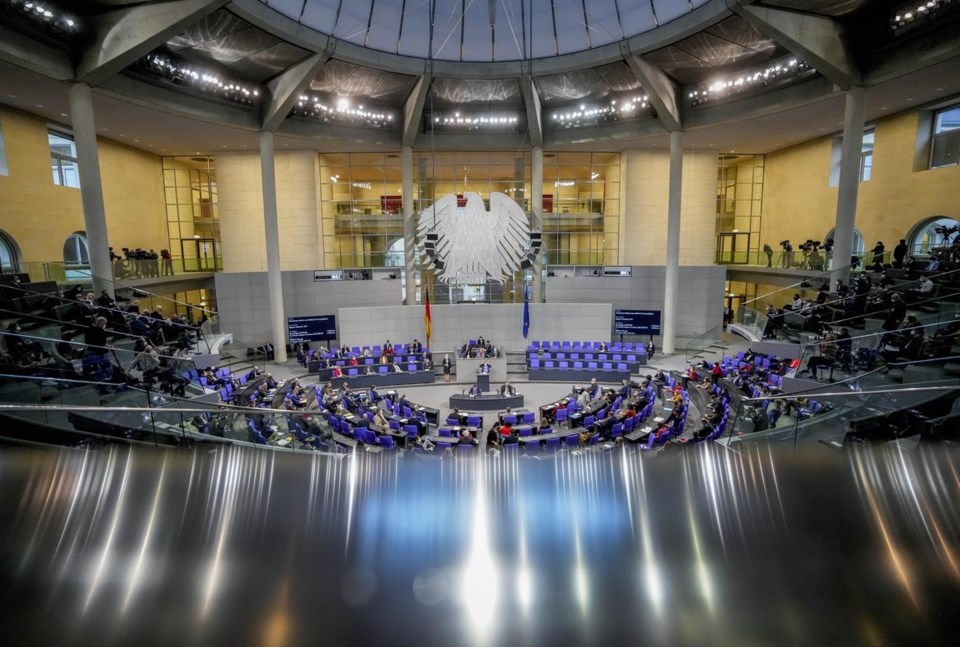BERLIN (AP) — Germany's parliament on Wednesday approved a resolution recognizing as genocide Ukraine's 1930s “Holodomor," a famine believed to have killed more than 3 million Ukrainians under the repressive rule of Soviet leader Josef Stalin.
The resolution was brought to the lower house, or Bundestag, by the three parties in Chancellor Olaf Scholz's governing coalition and the main opposition bloc. After a debate attended by Ukraine’s ambassador to Germany, it passed with their support in a show of hands, while the two other opposition parties abstained.
The vote comes days after Ukrainians marked the 90th anniversary of the start of the famine.
The resolution states that “the mass deaths from hunger were not a result of failed harvests; the political leadership of the Soviet Union under Josef Stalin was responsible for them." It adds that all things Ukrainian were “deeply suspect” to Stalin and notes that “the whole of Ukraine was affected by hunger and repression, not just its grain-producing areas.”
“From today's perspective, a historical and political classification as genocide is obvious,” the resolution says. “The German Bundestag shares such a classification.”
“This horror had its cause in the Kremlin — there, the dictator took the cruel decision to push through collectivization by force and cause hunger,” governing Green party lawmaker Robin Wagener told parliament. “And the killing by hunger also had as its aim the political repression of Ukrainian national identity, Ukrainian culture and language.”
He said that “the parallels with today are unmissable” — a point echoed by other speakers nine months into Russia’s invasion of Ukraine.
“Russia’s current war of aggression against Ukraine stands in this historical tradition,” conservative opposition lawmaker Volker Ullrich said.
Academic opinion remains divided about whether the famine constitutes a “genocide,” with the main question being whether Stalin intentionally wanted to kill Ukrainians as an attempt to quash an independence movement against the Soviet Union, or whether the famine was primarily the result of official incompetence along with natural conditions. Regardless, the “great famine” seeded lingering Ukrainian bitterness toward Soviet Russian rule.
According to the Holomodor Museum in Kyiv, 16 states in addition to Ukraine so far have recognized the famine as genocide: Australia, Ecuador, Estonia, Canada, Colombia, Georgia, Hungary, Latvia, Lithuania, Mexico, Paraguay, Peru, Poland, Portugal, the United States and the Vatican. Some other countries, including Argentina, Chile and Spain, have condemned it as “an act of extermination.”
Last week, Pope Francis of Ukrainians now to the 1930s “genocide artificially caused by Stalin."
Ukrainian President Volodymyr Zalenskyy hailed the German resolution's approval in his nightly video address Wednesday.
“This is a decision for justice, for truth," he said. "And this is a very important signal to many other countries of the world that Russian revanchism will not succeed in rewriting history.”
Wednesday's resolution calls on the German government among other things to work against “any attempts to spread one-sided Russian historical narratives” and to keep supporting Ukraine as a victim of the current war.
It notes that the famine in Ukraine happened in a period of massive crimes against humanity in Europe, which included the Nazi Holocaust “in its historical singularity,” the war crimes of the German military and the systematic murder of millions of civilians as part of the “the racist German war of annihilation in the east.”
Lawmakers also stressed that they had no intention of downplaying Germany’s history, including Nazi crimes in the Soviet Union. “We derive from Germany’s own past a particular responsibility within the international community to mark crimes against human rights and work through them,” said Gabriela Heinrich of the governing Social Democrats.
Such resolutions aren't binding and don't mandate government action, but Foreign Minister Annalena Baerbock has thanked lawmakers who championed it.
Geir Moulson, The Associated Press




